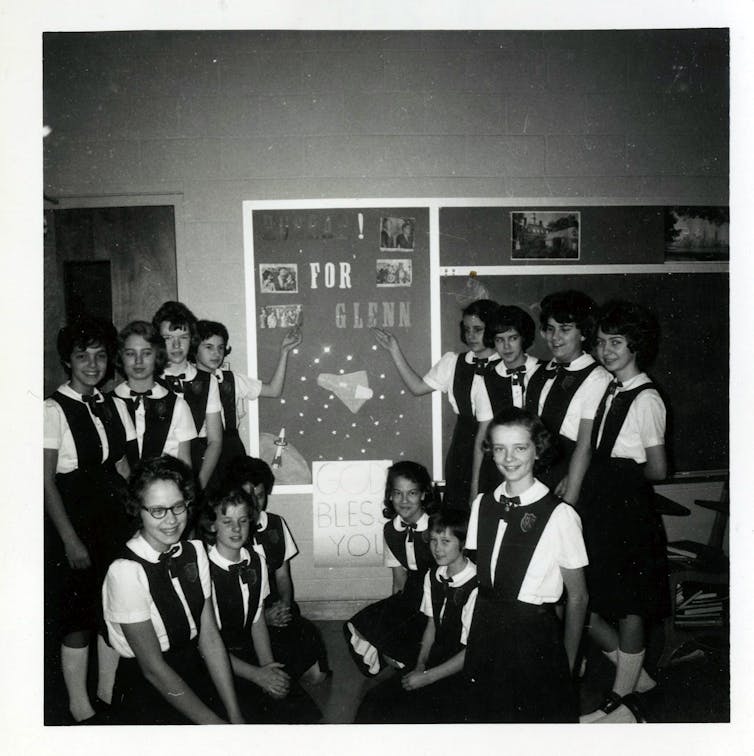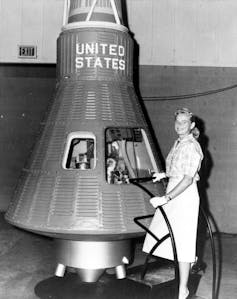John Glenn’s Fan Mail Shows Many Girls Dreamed of the Stars – but Sexism in the Early Space Program Thwarted Their Ambitions

Marilyn Nieves/iStock.com
Pioneering spacefarer John Herschel Glenn Jr. would have turned 100 on July 18, 2021.
When Glenn died in 2016, the famed astronaut was lauded as “the last genuine American hero.” NASA, the U.S. Marine Corps, President Barack Obama and many others posted tributes on social media.
Hundreds of nostalgic fans testified to Glenn’s impact on their own senses of youthful possibility. One woman recalled being a fifth grader in February 1962, listening to coverage of Glenn’s orbital flight at school on a transistor radio: “This was the definition of the future … I wanted to do hard math with slide rules and learn hard languages and solve mysteries. I wanted to be like John Glenn.”
Glenn’s life and legacy continue to be widely celebrated. Yet recent scholarship on the early Space Age has reawakened questions about the ways gender, race, ethnicity and class shaped the human space flight program in the U.S.
Was America’s first starman really everybody’s hero?
‘Even though I am a girl…’
As a historian undertaking a major research project called “A Sky Full of Stars: Girls and Space-Age Cultures in Cold War America and the Soviet Union,” I have analyzed hundreds of fan mail letters written by girls in the U.S. and USSR to the spacefarers Yuri Gagarin, John Glenn and Valentina Tereshkova. I set out to discover how young people experienced the early triumphs of human space flight, and how the dramatic events they witnessed influenced their own senses of what they could aspire to and achieve.

My research in the John H. Glenn Archives at The Ohio State University revealed that the majority of American girls’ letters to Glenn conformed to established gender conventions.
Girls frequently congratulated the astronaut on stereotypically masculine characteristics – strength and bravery – while denying that they themselves possessed those qualities. Some were openly flirtatious, offering admiring personal comments on Glenn’s appearance, physique and sex appeal. Some also wrote to request an autograph or glossy photo, embracing a well-established culture of celebrity and fandom that was pervasive among American girls of the era.
The letters that interest me most are from girls who were so inspired by Glenn’s accomplishment that they envisioned for themselves a place in the STEM world of science, technology, engineering and math.
Some wrote to Glenn to report about their science fair projects or rocket design clubs and to ask for technical advice. Some expressed the desire to follow their hero into careers in aviation and astronautics, even as they expressed skepticism that such a path would be open to them.
The formulation “even though I am a girl I hope to be just like you” in various manifestations appeared as a steady refrain in girls’ letters.
Diane A. of Fergus Falls, Minnesota, wrote, “I would very much like to become an astronaut, but since I am a 15-year-old girl I guess that would be impossible.”
Suzanne K. from Fairfax, Virginia, was more defiant: “I hope I go to the moon sometime when I’m older. I’m a girl but if men can go in space so can women.”
Carol C. of Glendale, New York, wrote to ask “this one simple question concerning a woman’s place in space. Will she only be needed around Cape Canaveral or will she eventually accompany an astronaut into space? If so I sure wish I were she.”
The news that “the Russians” had sent a woman into space in June 1963 emboldened some girls to ask Glenn more pointed questions.
Ella H., an African American girl from segregated Meridian, Mississippi, wrote on behalf of her junior high school class to inquire, “What were our male astronauts’ reactions when Russia’s female astronaut made more orbits than they? … Do you seven male astronauts think that a woman will go into space within the next two years?”
Meanwhile, Patricia A. of Newport News, Virginia, asked Glenn outright, “Do you think that sending women into space is a very good idea?”
Glenn and the ‘problem’ of ‘lady astronauts’

While few of his replies to letter writers were preserved in the archive, those that exist suggest Glenn avoided encouraging girls’ dreams of flight and space exploration.
Fourteen-year-old Carol S. in Brooklyn wrote to her “idol” to share her “strong desire to be an astronaut” and seek Glenn’s advice on how to overcome the obstacle of being a girl, “a slight problem it seems.” Glenn replied four months later to thank Carol for her letter, but rather than answering her query directly he enclosed “some literature which I hope will answer your questions.”
A girl named “Pudge” from Springfield, Illinois sent a long enthusiastic letter sharing her plans to join the Air Force and her “thrill at the sight or sound of jets, helicopters (especially the H-37A ‘Mojave’) rockets or anything connected with space, the Air Force or flying.” Glenn sent a friendly reply including “some literature about the space program which I hope you will enjoy,” but said nothing about the viability of the girl’s aspirations.
Hard evidence of Glenn’s position on the question of “lady astronauts” came in the form of his congressional testimony in July 1962. A Special Subcommittee on the Selection of Astronauts of the House Committee on Science and Astronautics was formed in response to the quashing of the privately funded “woman in space” program and related allegations of sex discrimination at NASA.
A March 1962 letter from the director of NASA’s Office of Public Services and Information to a young girl who had written to President John F. Kennedy to ask if she could become an astronaut stated that “we have no present plans to employ women on space flights because of the degree of scientific and flight training, and the physical characteristics, which are required.”
Glenn’s testimony before the subcommittee echoed that position. In his opinion, the best-qualified astronauts were those who had experience as military pilots, a career path that was closed to women. In a much-quoted statement, Glenn asserted that “the men go off and fight the wars and fly the airplanes and come back and help design and build and test them. The fact that women are not in this field is a fact of our social order.” The subcommittee’s final report concurred, effectively barring female applicants from consideration for the Apollo missions.

Girls in space
The relationship between Glenn and his young female fans was complicated by the male-dominated cultures of mid-20th-century America. Prevailing gender stereotypes, limited opportunities, sexism and a lack of STEM role models all stood between girls’ dreams and the stars.
Glenn’s position on the “lady astronaut” problem evolved in a more egalitarian direction after he left NASA. As historian Amy E. Foster noted, a May 1965 Miami Herald article headlined “Glenn Sees Place for Girls In Space” quoted the astronaut as saying that NASA’s plans to develop a new “scientist-astronaut” program should “offer a serious chance for space women.”
Glenn’s prediction was on the mark. The “social order” that Glenn discussed in July 1962 has shifted dramatically in the intervening decades. NASA’s space shuttle program opened the door for Sally Ride’s voyage in 1983, establishing her as a powerful inspiration for girls. While cultural obstacles remain, NASA has diversified the astronaut corps significantly and has taken conscious steps to make the agency more inclusive overall.
A much wider spectrum of positive STEM role models exists for girls today. The book and film “Hidden Figures” celebrated the accomplishments of Katherine Johnson, Mary Jackson and Dorothy Vaughn – three Black women of NASA who helped make Glenn’s success possible. Documentaries and websites record the stories of pioneering female spacefarers. Television series including “For All Mankind” and “Away” imagine a past and future where female astronauts are central to American ambitions in space.
Women’s opportunities in the real world are expanding as well. Two of Virgin Galactic’s first flown astronauts are women. At 82, Mercury 13 alumna Wally Funk is poised to break Glenn’s record as the oldest human in space when she flies with Blue Origins on July 20, 2021.
As barriers continue to fall, NASA has grand plans for the revival of human spaceflight. Prompted in part by women’s tepid support for high-stakes missions to the Moon and Mars, NASA is taking unprecedented steps to showcase the talents and ambitions of female astronauts. After an initial misstep, the first all-female spacewalk took place in October 2019. More importantly, Project Artemis promises to land a woman on the Moon in 2024.
Fan mail letters to John Glenn offer a potent reminder that astronaut heroics can have a powerful impact on young people’s attitudes and aspirations. A woman on the Moon is sure to inspire a new generation of girls to reach for the stars. NASA is banking on just that.
This is an updated version of an article originally published on Dec. 12, 2016.
Roshanna P. Sylvester is an associate professor of Critical Media Practices and Digital Humanities at the University of Colorado Boulder.
![]() This article is republished from The Conversation under a Creative Commons license. Read the original article.
This article is republished from The Conversation under a Creative Commons license. Read the original article.





